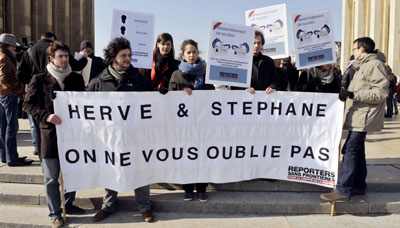What can we do to help liberate our colleagues? French journalists have been struggling with this dilemma since December 30, when two reporters of the public service TV channel France 3 and their three Afghan fixers were abducted by a group purportedly linked to the Taliban in the region of Kapisa, in eastern Afghanistan.
In the past, from Jean-Paul Kauffmann in Lebanon in 1985-88 to Florence Aubenas in Iraq in 2005, the French media and press associations had systematically launched high-profile solidarity campaigns with public demonstrations, banners hanging from municipal building, TV spots, and petitions.
This time it took 70 days before they organized the first public event, a low-key demonstration on Tuesday in Paris and a few other French cities. Although they had the agreement of the journalists’ families, the organizers appeared hesitant, unsure about how to proceed: The two journalists were mentioned, as they have been in public accounts, by first name only, Hervé and Stéphane. Their portraits were just black silhouettes on billboards, and the statements seemed cautious and restrained.
This event was a reflection of the dilemmas and doubts about the best approach to free the hostages. “Should we drum up public support or respect the complete silence requested by the French intelligence agencies?” asked some participants. “We are not really sure what we should do.”
The demonstration, however, had another script beyond the fate of the hostages: The demonstrators convened by Reporters Without Borders, the National Union of Journalists (SNJ), the France 3 journalists’ association and Hostages of the World wanted to send a message to the French government: Hervé and Stéphane are not reckless reporters, they knew the risks of their assignment, and they acted professionally. The French press has the right to cover wars independent of official instructions.
Indeed, this hostage crisis has been marred from the beginning by a very tense exchange between representatives of the state and the press. The controversy had been brewing for years. After Aubenas’ liberation from her Iraqi kidnappers in June 2005 the French media had seemed to abide by the government’s calls for utmost caution and refrained from sending reporters on dangerous assignments when the risk, as assessed by the French military, seemed too high.
According to Elysée insiders, President Nicolas Sarkozy’s first reaction to the news of the abduction of the France 3 reporters was to slam the “unconscious behavior” of the two journalists. A few days later, during a ministerial meeting, the French president insisted: “These journalists have acted contrary to the safety guidelines. It is intolerable to see that our military have to take risks to look for them in a dangerous zone where they had been forbidden to go.”
On January 17, Claude Guéant, the general secretary of the Elysée, openly expressed his irritation. “You cannot try to get a scoop at all cost. These journalists create major risks for our armed forces which are, in fact, diverted from their main missions.”
Adding insult to injury, in late February the chief of the French Army, Gen. Jean-Louis Georgelin, complained on a major French radio station about the cost of the attempts to free the hostages: “We have already spent 10 million euros on this operation”, he said acidly. “It is a drain on our budget.”
The reactions of the media were immediate and outraged, especially since they had been asked by the authorities to keep silent in order to not raise the stakes and hamper the negotiations.
Florence Aubenas snapped back: “Journalists have up to now respected the instruction to be silent. What is surprising is that this instruction is broken by the ones who ordered it and instead of words of compassion or solidarity they only heap reproaches on our colleagues.”
“It is a shame,” said Anne Nivat, one of the most famous French war correspondents. “Covering a war is by definition risky. You cannot content yourself with the war coverage of the spin service of the army!”
Opacity continues to prevail on the fate of the hostages. In February, a video showed that the two French journalists were alive, and it was learned that the Afghan driver had been released. But there was no news on the other two Afghan assistants.
Most of the French media have been focusing on their two colleagues, and the hostages’ story seems to have become a French story enmeshed in French politics.
On Tuesday, however, although the most visible placards mentioned only Hervé and Stéphane some speakers referred to Mohamed, Ghulam, and Satar, the three Afghan assistants, an acknowledgment that international journalists could not even think of working in Afghanistan without the support and courage of local journalists and fixers.
